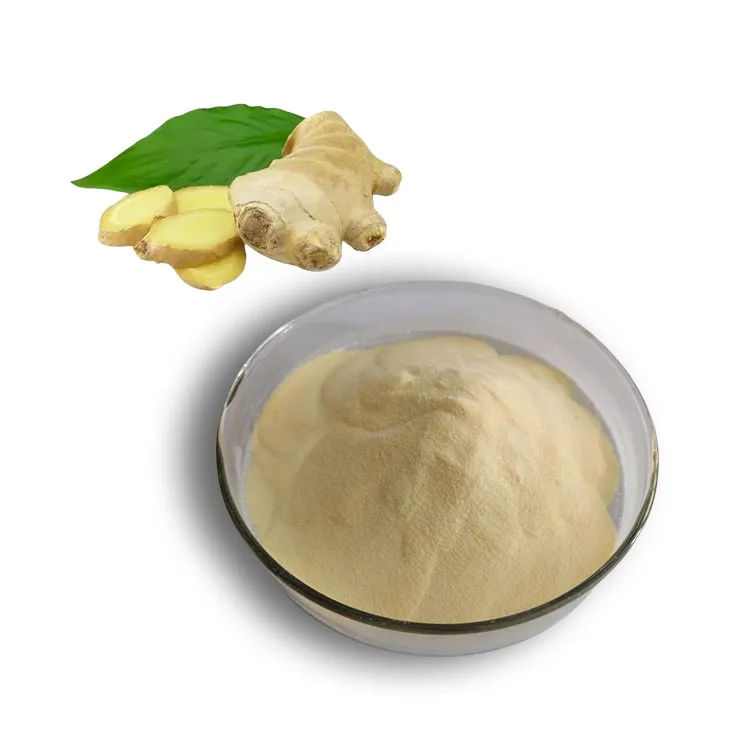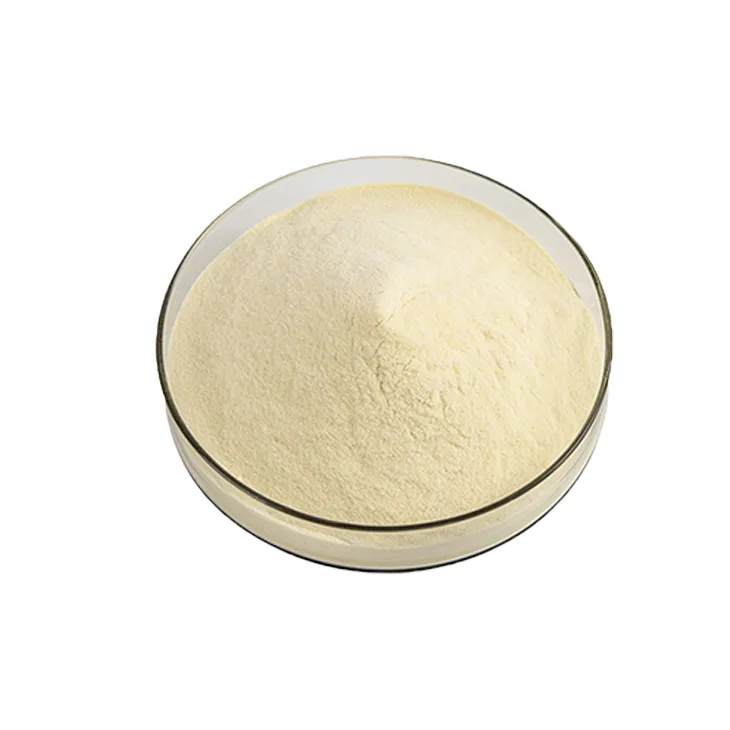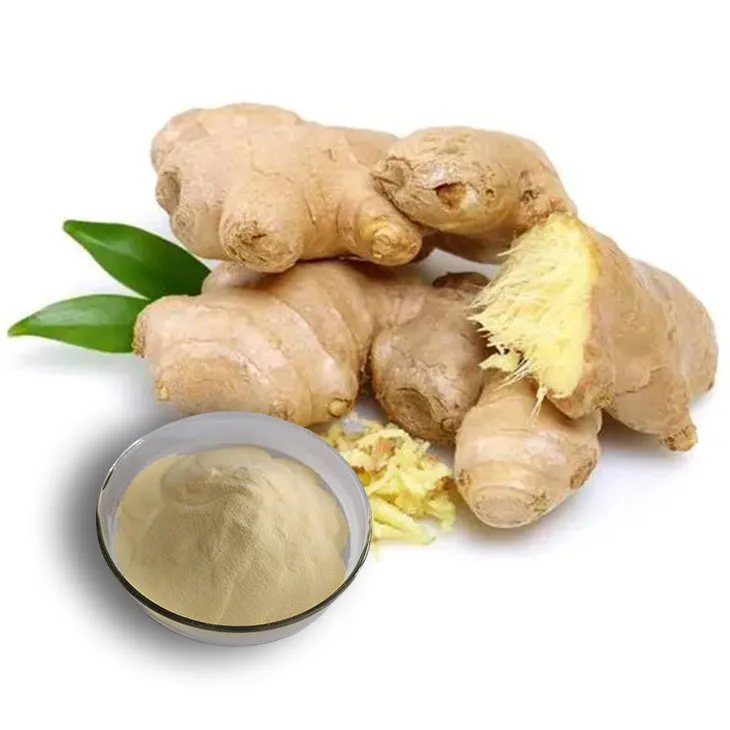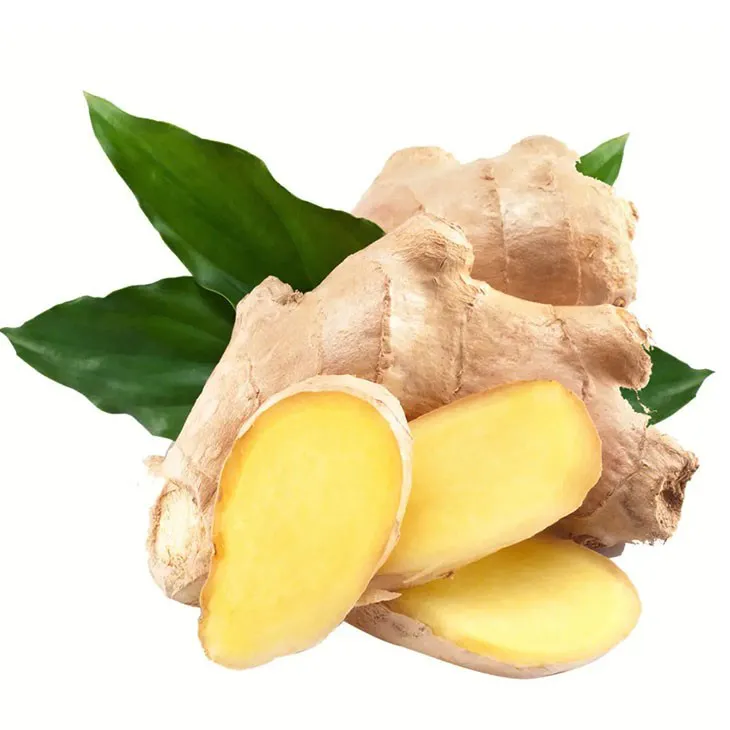- 0086-571-85302990
- sales@greenskybio.com
Organic Ginger Extract Powder Factory.
2024-12-02

1. Introduction to Organic Ginger Extract Powder Factory
An organic Ginger Extract powder factory is a significant entity in the natural health and food supplement industry. It serves as a place where the power of organic ginger is harnessed and transformed into a highly useful product - Ginger Extract powder. Organic ginger has long been recognized for its myriad health benefits, and these factories play a crucial role in making its goodness accessible in a concentrated and convenient form.

2. The Sourcing of Organic Ginger
The process of creating organic ginger extract powder begins with a very important step - sourcing the finest organic ginger.
2.1 Cultivation in Ideal Environments
Organic ginger roots are typically cultivated in pesticide - free and sustainable environments. These are areas where farmers adhere to strict organic farming practices. They avoid the use of synthetic pesticides, fertilizers, and genetically modified organisms (GMOs). Instead, they rely on natural methods such as crop rotation, composting, and biological pest control. For example, some farmers use beneficial insects like ladybugs to control pests that might otherwise damage the ginger plants. This not only ensures the purity of the ginger but also contributes to the overall health of the ecosystem.
2.2 Quality Assurance at the Source
When sourcing ginger, the factories have a set of criteria to ensure quality. They look for ginger roots that are firm, have a fresh aroma, and are free from any signs of disease or damage. Certifications also play a vital role. Many organic ginger suppliers are required to have organic certifications from recognized bodies. These certifications guarantee that the ginger has been grown and processed according to the strict standards of organic agriculture. This gives consumers confidence that the final product, the organic ginger extract powder, is of high quality and free from harmful substances.

3. The Processing of Organic Ginger
Once the organic ginger is sourced, it undergoes a series of processing steps to turn it into extract powder.
3.1 Washing and Preparation
After harvesting, the ginger roots are thoroughly washed. This is to remove any dirt, debris, or other impurities that may be present on the surface. Washing is a meticulous process as any contaminants left on the ginger can affect the quality of the final extract powder. Once washed, the ginger is prepared for extraction. This may involve cutting or slicing the ginger into smaller pieces to increase the surface area for extraction, which helps in more efficient extraction of the active compounds.
3.2 Extraction Techniques
Advanced extraction techniques are employed in the factory to ensure that the valuable active compounds in ginger are retained in the powder. Ginger contains important compounds such as gingerols and shogaols, which are responsible for many of its health - promoting properties. These extraction techniques are designed to extract these compounds without degrading them. Some common extraction methods include solvent extraction and supercritical fluid extraction.
- Solvent extraction: In this method, a suitable solvent is used to dissolve the active compounds from the ginger. The solvent is then removed, leaving behind the concentrated extract. However, the choice of solvent is crucial as it should be safe for human consumption and should not leave any harmful residues in the final product.
- Supercritical fluid extraction: This is a more advanced and environmentally friendly method. Supercritical fluids, such as carbon dioxide, are used as the extracting agent. Supercritical carbon dioxide has properties similar to both a gas and a liquid, which allows it to penetrate the ginger matrix and extract the active compounds effectively. The advantage of this method is that it can operate at relatively low temperatures, which helps in preserving the integrity of the active compounds.

4. Applications of Organic Ginger Extract Powder
The organic ginger extract powder produced by these factories has a wide range of applications in different sectors.
4.1 In the Food Industry
In the food industry, organic ginger extract powder is a popular ingredient. It is used as a flavor enhancer in a diverse range of products.
- Beverages: One of the most common uses is in ginger tea. Ginger tea is known for its warming and soothing properties. The addition of organic ginger extract powder gives the tea a concentrated ginger flavor. It can also be used in other beverages such as ginger - flavored sodas, juices, and smoothies, adding a spicy and refreshing twist.
- Baked Goods: In baking, ginger extract powder can be added to cookies, cakes, and bread. It imparts a unique ginger flavor that is both spicy and aromatic. For example, gingerbread cookies are a classic holiday treat, and the use of ginger extract powder can enhance the traditional ginger flavor, making them even more delicious.
- Seasonings and Sauces: Organic ginger extract powder can be used in spice blends, marinades, and sauces. It adds a depth of flavor to savory dishes. For instance, in Asian cuisine, ginger is a key ingredient in many stir - fry sauces, and the extract powder can be used to intensify the ginger flavor.
4.2 In the Pharmaceutical and Nutraceutical Fields
In the pharmaceutical and nutraceutical fields, organic ginger extract powder is highly valued for its various health - promoting properties.
- Anti - inflammatory Properties: Ginger contains compounds that have anti - inflammatory effects. Inflammation is associated with many chronic diseases, and the anti - inflammatory properties of ginger extract powder can be beneficial in managing conditions such as arthritis. Studies have shown that gingerols and shogaols can inhibit the production of inflammatory mediators in the body.
- Antioxidant Properties: The extract powder is also a rich source of antioxidants. Antioxidants are important for protecting the body against oxidative stress, which is caused by free radicals. Free radicals can damage cells and contribute to the development of diseases such as cancer and heart disease. By consuming ginger extract powder, the body can benefit from its antioxidant content, which helps in neutralizing free radicals.
- Digestive - aid Properties: Ginger has long been used as a digestive aid. It can help relieve nausea, indigestion, and bloating. The active compounds in ginger extract powder stimulate the digestive system, increasing the production of digestive enzymes and promoting the movement of food through the digestive tract.

5. Quality Control in the Factory
Quality control is a top priority in an organic ginger extract powder factory. Stringent tests are carried out at every stage of production to ensure the purity, potency, and safety of the final product.
5.1 Testing for Contaminants
The factory tests for various contaminants that could potentially be present in the ginger extract powder. This includes testing for heavy metals such as lead, mercury, and cadmium. These heavy metals can be harmful if consumed in excessive amounts. Additionally, tests are carried out for microbial contaminants such as bacteria, yeast, and mold. Microbial contamination can cause spoilage of the product and pose a risk to human health. The factory uses advanced analytical techniques to detect these contaminants at very low levels, ensuring that the product is safe for consumption.
5.2 Verifying the Concentration of Active Ingredients
Another important aspect of quality control is verifying the concentration of the active ingredients in the ginger extract powder. As mentioned earlier, gingerols and shogaols are the key active compounds in ginger. The factory uses analytical methods to accurately measure the levels of these compounds in the final product. This ensures that the product has the expected potency and can deliver the claimed health benefits. If the concentration of active ingredients is too low, the product may not be effective, and if it is too high, it could pose potential risks.
5.3 Ensuring Compliance with International Organic Standards
To maintain the integrity of the organic label, the factory must ensure compliance with international organic standards. These standards cover various aspects of production, from the sourcing of organic ginger to the processing and packaging of the extract powder. The factory is regularly audited by independent certification bodies to verify that it meets these standards. This includes maintaining proper documentation of all organic - related activities, such as the origin of the ginger, the extraction process, and the handling of the final product. Compliance with these standards not only ensures the quality of the product but also helps in building consumer trust.
6. Contribution to Environmental Sustainability
Organic ginger extract powder factories also play an important role in promoting environmental sustainability.
6.1 Promoting Organic Farming Practices
By sourcing ginger from organic farms, these factories encourage the use of organic farming practices. Organic farming reduces the use of harmful chemicals in agriculture. This has several benefits for the environment. Firstly, it helps in protecting soil quality. Chemical fertilizers and pesticides can degrade the soil over time, reducing its fertility. Organic farming methods, on the other hand, build soil health through the addition of compost and the use of cover crops. Secondly, it protects water quality. Chemical runoff from conventional farms can contaminate water sources, but organic farming reduces this risk as it does not use synthetic chemicals that can leach into water bodies.
6.2 Supporting Local Farming Communities
These factories also contribute to the well - being of local farming communities. By providing a market for organic ginger, they help farmers earn a stable income. This, in turn, can support the development of rural areas. For example, farmers can invest in better farming equipment, improve their living conditions, and support local schools and other community services. Additionally, some factories may provide technical support and training to farmers, helping them improve their organic farming practices and increase their yields.
FAQ:
What are the main health benefits of organic ginger extract powder?
Organic ginger extract powder has several health benefits. It has anti - inflammatory properties, which can help reduce inflammation in the body. It also acts as an antioxidant, protecting cells from damage caused by free radicals. Additionally, it aids in digestion, which can be beneficial for those with digestive issues.
How is the quality of organic ginger extract powder ensured in the factory?
Quality control in the factory is very strict. At every stage of production, various tests are carried out. Tests are done to check for contaminants, verify the concentration of active ingredients like gingerols and shogaols, and ensure that the product complies with international organic standards.
What are the applications of organic ginger extract powder in the food industry?
In the food industry, organic ginger extract powder has wide applications. It is used as a flavor enhancer. For example, it can be added to ginger tea to enhance the ginger flavor. It is also used in baked goods to give a unique taste.
How does the factory support environmental sustainability?
The factory promotes organic farming practices for ginger cultivation. By doing so, it helps reduce the use of harmful chemicals in agriculture. This not only benefits the environment but also supports local farming communities.
What extraction techniques are used in the organic ginger extract powder factory?
Advanced extraction techniques are used in the factory to ensure that the active compounds in ginger are retained in the powder. However, the specific techniques may vary depending on the factory's technology and equipment, but they are all designed to extract gingerols and shogaols effectively.
Related literature
- Organic Ginger: Cultivation and Health Benefits"
- "The Production and Quality Control of Organic Extract Powders"
- "Ginger Extract in Food and Pharmaceutical Industries"
- ▶ Hesperidin
- ▶ citrus bioflavonoids
- ▶ plant extract
- ▶ lycopene
- ▶ Diosmin
- ▶ Grape seed extract
- ▶ Sea buckthorn Juice Powder
- ▶ Beetroot powder
- ▶ Hops Extract
- ▶ Artichoke Extract
- ▶ Reishi mushroom extract
- ▶ Astaxanthin
- ▶ Green Tea Extract
- ▶ Curcumin Extract
- ▶ Horse Chestnut Extract
- ▶ Other Problems
- ▶ Boswellia Serrata Extract
- ▶ Resveratrol Extract
- ▶ Marigold Extract
- ▶ Grape Leaf Extract
- ▶ blog3
- ▶ blog4
-
The best lemon juice powder in nature.
2024-12-02
-
Organic Vitamin K2 Powder Suppliers
2024-12-02
-
Bulk purchase of L - tyrosine.
2024-12-02
-
Vitamin K2 Manufacturers
2024-12-02
-
100% Pure Natural Rutin.
2024-12-02
-
Chinese Citrus Bioflavonoid Suppliers.
2024-12-02
-
Konjac Powder
2024-12-02
-
Citrus Aurantium Extract
2024-12-02
-
Apricot Powder
2024-12-02
-
Carrageenan Extract Powder
2024-12-02
-
Angelica sinensis extract
2024-12-02
-
Giant Knotweed Extract
2024-12-02
-
Astaxanthin
2024-12-02
-
Nettle Root Extract
2024-12-02
-
Licorice Root Extract Powder
2024-12-02
-
Sophora Flavescens Root Extract
2024-12-02





















